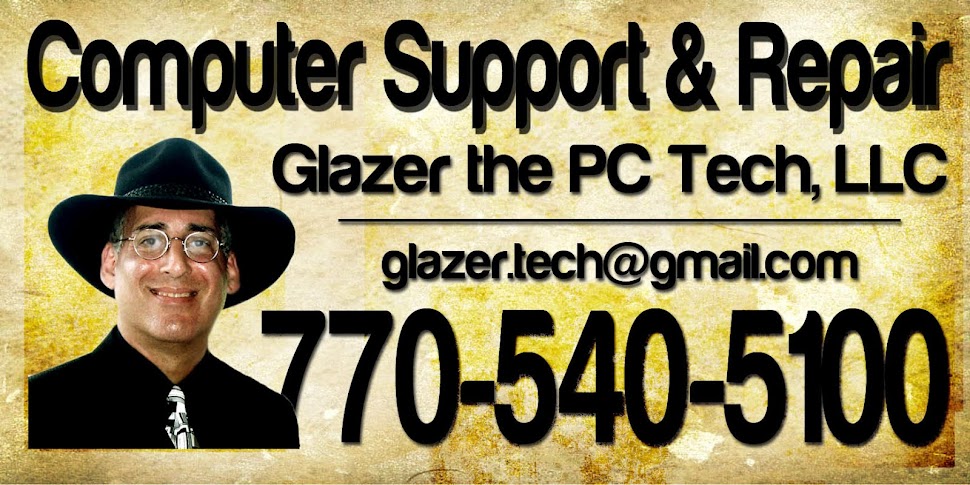
Computer Care: High tech devices bring the future to the present
By Arthur Glazer
arthur@glazerthepctech.com
POSTED: May 28, 2011 1:00 a.m.
Twenty-five years ago, my most high-tech device was an electric typewriter. Now I have GPS in my pocket and a Bluetooth in my ear. Being the techno-geek that I am, I can't help but wonder what the future holds.
I can only speculate what it'll be like in a few years, but I can tell you what we'll be using next year.
Cloud computing has taken hold recently. For those not in the know, the Cloud is the Internet. Instead of using your computer for storage, you can use a company's, via the Internet, often for free.
But more is coming. Soon apps will be available.
Actually some are already here. Currently Google has its Google Docs and Microsoft is working on a similar version of its own.
Many of the services are free, others are subscription-based.
According to Google, their Docs are a "software as a service" office suite. The same documents one can create with an installed office suite can be created in their cloud for free.
Documents can be shared and edited by multiple users simultaneously. Google Docs is one of many cloud computing document-sharing services. The majority of them require user fees, whereas Google Docs has none.
Google's Chrome laptop will be out this summer. Acer and Samsung will be the first to have the Cloud-based laptops. The operating system, in the Chrome browser with all apps and storage, will be on the cloud. You can switch computers and log onto your account to continue working.
If you lose your laptop, you can still access your stuff by logging on and recovering your docs with another computer. They are reportedly to be in the $300 range.
Sales of tablet PCs like the iPad and book-readers like Kindle and Nook are on the rise.
More computers are being sold with Linux, a free alternative operating system. In a bad economy, no one wants to spend money if they don't have to.
No matter what type of computer you will be using, chances are it will have some type of solid state hard drive in it (like the flash memory in your digital camera or your USB storage device). Conventional drives have moving parts; these don't.
Already, hybrid drives are in some of today's computers; part conventional, part solid state. They will be more apparent in the near-future.
A new kind of memory, ultra-rapid, non-volatile read-write magnetic memory, will also soon be in computers. They are supposed to be much faster and consume less power than what we use today. Although magnetic, it has no moving parts. Researchers say it should be in devices in 3-5 years.
Processors that began as a unit will go from dual to quad-core and be faster still.
If you look around, you'll realize computers, in one form or another, are ubiquitous. They are everywhere, not just in our desk and laptops. They're in our phones, cameras, televisions, stereos, thermostats, watches, kitchen and laundry appliances and even on our pets.
As microchips grow smaller and cheaper, they will appear in more and more devices.
Mobile computing is becoming easier as cellphones get smarter. While some PCs are getting more like phones, more phones are getting like PCs. Many connect to the Internet for web browsing and email. With the abundance of apps available, anything done on a PC can now be done on a smartphone.
Each phone company has its own operating system, making it confusing for the consumer. Perhaps one day Android, Apple, Windows Mobile, Palm and Symbian will merge to one ... nah.
Your smartphone will soon be used as a payment mechanism. According to Google, they along with Verizon, ATT, Sprint and T-Mobile, are building Google Wallet, a payment service that would let users buy goods from various vendors by scanning their mobile phones instead of a credit card. Their service should debut this year.
Another company offers Card Case, a feature within its app that also allows customers to purchase things without having to swipe a card. You open a tab in the app, say your name during checkout and are sent a text message receipt. See it at squareup.com.
They also offer a device for mobile merchants that will allow you to swipe a credit card. The free device will attach to most phones' audio ports. Their rates are 2.75 percent, which is not bad.
It's hard to keep up. The 1 terabyte (1,000 gigabyte) storage device you may have today is 50,000 times the size of the 20 megabyte hard drive from a 386-SX computer of 1988.
Even though Moore's Law states that computing power doubles approximately every 18 months, Murphy's Law says that just when you get to the point where you really understand your computer, it's probably obsolete.
Technologically it's been a great ride, full of thrills and breath-taking moments, even if the tickets have been expensive at times. I'm not always first in line for the next ride, but I always look forward to it.
Arthur Glazer is a freelance writer and computer technician in Gainesville. His column appears biweekly on the Business page and on gainesvilletimes.com.

No comments:
Post a Comment
Got a Comment - or a quick question...